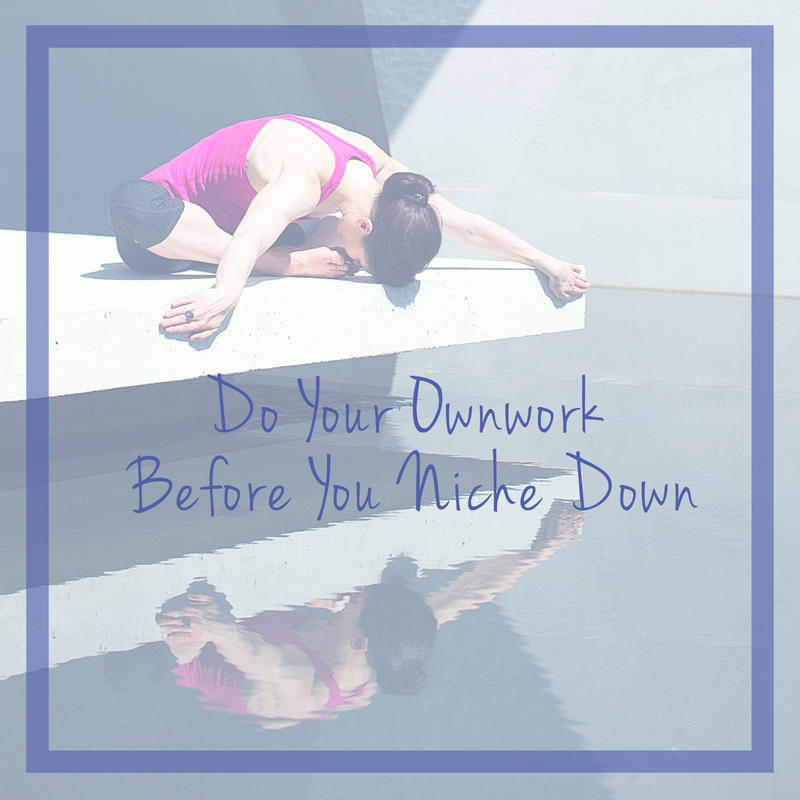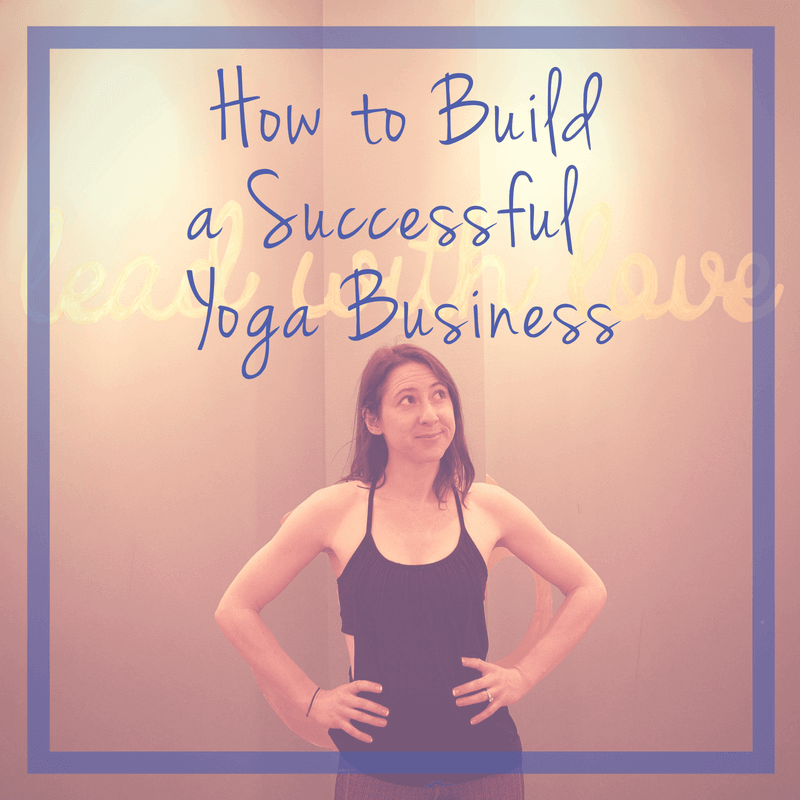One of the big takeaways from my full-time yoga teacher project was the mindset difference between yoga teachers and yoga professionals.
That’s not to say that all yoga teachers don’t act professionally.
It speaks more to a mindset about yoga being a legitimate career rather than a part-time hobby. With the yoga industry landscape changing quickly, it’s more important than ever that yoga teachers remain at the forefront of innovation, lest we get left behind and trampled over by corporate interests that seldom align with yogic thought.
To be part of the conversation of how yoga is evolving in the world, yoga professionals must have a seat at the table.
Here is what makes a yoga professional different from a yoga teacher.
Yoga professionals aren’t afraid to try new things.
They think outside the studio. It’s been well established now that while it is possible to make a living teaching yoga classes only, it’s incredibly unsustainable long-term and you have to be a clone of the Energizer super bunny with crazy extrovert status to make it happen and not get burnt out fast.
My advice? Don’t do it!
Instead, where else can you teach? What other establishments are willing to rent you space for cheap or collaborate with you to offer classes, series, workshops, and trainings?
This doesn’t mean you have to ignore the yoga studio. The studio is arguably still the best space to offer yoga with a built-in clientele of dedicated practitioners and props at the ready. You can’t replace the special feeling of a yoga studio, but you can make more money doing the same thing elsewhere.
Yoga professionals know how to tailor their message to the right audience.
This requires firstly understanding who your audience is and overcoming the fear of nicheing down.
Getting to this point does take some time. In the “Yoga For…” age, it’s more important than ever to clearly stand for something. Everybody doesn’t count.
Do you teach yoga for low back pain? Yoga for new moms? Yoga for athletes? Yoga for cancer? Yoga for fertility?
Here are a few quick questions to consider if you need a jumpstart figuring this out.
- What do you love teaching?
- Who do you enjoy teaching the most?
- How has yoga helped you in your own life?
Now that you know what you’re teaching, you’ll need to make sure you are qualified to teach to this specific topic. That qualification may come from personal experience, or you may be able to find specialized training. If none exist, at the very least drop-in to some classes offering something similar (often you can find classes online if there is nothing in your community).
Read some books, look up the research, become an expert in your topic! This will lend you more credibility over time.
Once you are an expert in your niche, chances are you’ll know exactly where to go to find your people.
You teach yoga for low back pain? Get to know your local chiros.
You teach yoga for new moms? Lucky you — there are tons of places that already cater to new moms. How about lunching with some postpartum doulas?
See where I’m going here?
Once you niche down, it becomes so much easier to market your offerings. Now you know exactly where to go to find your people AND you know how to talk to them about what they’re going through because you’re an expert in what you do.
Yoga professionals never stop learning.
I’ve yet to meet a yoga teacher who doesn’t love learning. But what separates yoga teachers from yoga professionals is a willingness to learn about business and acquire other necessary knowledge outside the yoga realm.
Yoga professionals understand the importance of knowing how to run a business and they seek out the training for it.
They understand the need to market, even if they despise it, and they find the information they need to do it the best they can despite their resistance.
And, when they finally reach a place where they can afford to hire someone else to do the tasks they despise, they go off and learn about how to hire people.
The trick is not to get stuck in the learning. Successful yoga professionals have a penchant for learning #allthethings but also rely on a bias toward action. (Funny, cuz that’s called Classical Yoga Philosophy.)
Yoga professionals spend a lot of time cultivating and maintaining authenticity.
This sounds weird, but it’s true. Authenticity is super important to most yoga teachers. But it’s the ones who stay fiercely dedicated to remaining true, while still striving to make things work financially, that succeed the most. Call it Karma, but those who remain true to who they are and to the principles of yoga often receive a devoted student base. It’s that devoted student base that helps build financial sustainability.
Yoga professionals want to contribute to the wellbeing of society.
And, even more directly, to the wellbeing of their own family. Every yoga professional I’ve ever talked to is mildly obssessed with this idea of contribution.
To paraphrase one of the teachers who I interviewed for my full-time yoga teacher project, she felt awful that she had to rely on her husband’s income to pay for their annual vacation.
All yoga professionals want is to be able to pay for their own plane ticket to Hawaii! Is that so much to ask in return for helping students feel better, relieve pain, reduce suffering, and release stress?
It’s not like yoga professionals are trying to become millionaires here. They just want to meaningfully contribute to their family’s lifestyle by doing what they love and helping out society in the meantime.
Which brings me to…
Yoga professionals aren’t afraid of money.
They might have some issues around money, but they aren’t afraid to embrace the idea that it’s okay, even necessary (gasp!), to accept money in exchange for teaching. They track their income and have a system in place for monthly business expenses. They have business accounts, know what they can and can’t write off for taxes, and have monthly, quarterly, and annual revenue goals. (Make sure to sign up for my teacher newsletter if you haven’t already to get a tracker template!)
Yoga professionals know how to diversify their income streams.
One question I asked all the yoga teachers I interviewed in my full-time yoga teacher project was how they diversified their income. Many of them didn’t have an answer to that. How do you know where to focus your energy if you can’t determine which teaching-related activity specifically nets you the most profit?
You might be spending most your time teaching studio classes, but if you make more money from the few private clients you see each month, then that’s saying something.
Diversifying, and then optimizing, your income stream is all about working smarter, not harder.
Yoga professionals understand the power of collaboration.
One of the studios I teach at recently ran a month-long membership promotion they called #bettertogether. It was genius. Bring your friend to yoga for free, because yoga is better when we all practice together.
Same goes for teaching. Have you ever led a teacher training by yourself? It’s a lot of work. Way better when you have help.
Have you ever tried to run a retreat by yourself? Uh, yeah. That’s a lot of work too. So much better when you have someone else contributing (and we already learned that yoga professionals love contribution).
The best way to raise your own profile as a yoga professional is to work with other yoga professionals. A rising tide lifts all boats as they say.
(I checked, and “they” happens to be the New England Council, a regional Chamber of Commerce group, in case you were wondering.)
Yoga professionals willingly model a code of ethics.
In yoga, while there is no official/legal ethical standard in the industry, there is something called the Yamas and Niyamas baked right into the philosophy of the practice we teach.
Yes, Yoga Alliance and the International Association of Yoga Therapists have a code of ethics that we agree to follow when we become members of these organizations, but since it’s not mandatory to be a member of either, there is no one stopping us from doing unethical things. Except for ourselves and fellow yoga professionals.
Luckily, the Yamas and Niyamas feel a little more holistic then most legalese-sounding organizational codes. That is not to say that it’s not challenging to uphold these standards. But, at least personally, I feel good about challenging myself (and being challenged by others) to uphold the following ideals in living my life and running my business.
- Have compassion for your fellow human beings
- Be honest (and kind)
- Practice abundance
- Give back to your community
- Practice moderation
- Be pure in your words and deeds
- Be content with where you are without losing your sense of curiosity
- Promote discipline
- Take time to reflect
- Surrender the fruits of your actions
So, do you consider yourself a yoga teacher or a yoga professional? Any other ideas for what differentiates the two in your experience?
Regardless of where you stand right now, you can learn the skills to become a yoga professional. It certainly takes work, drive, and a deep desire to do good in the world, but you can do it. I believe in you!





